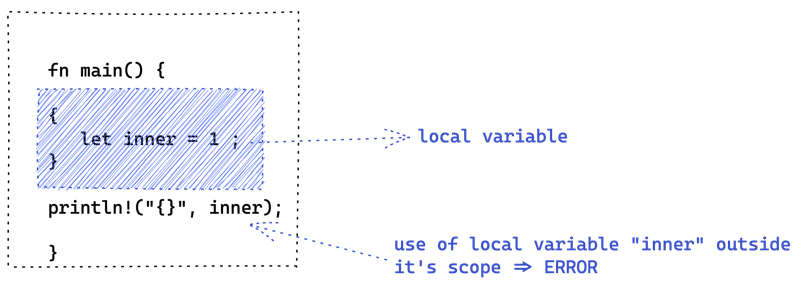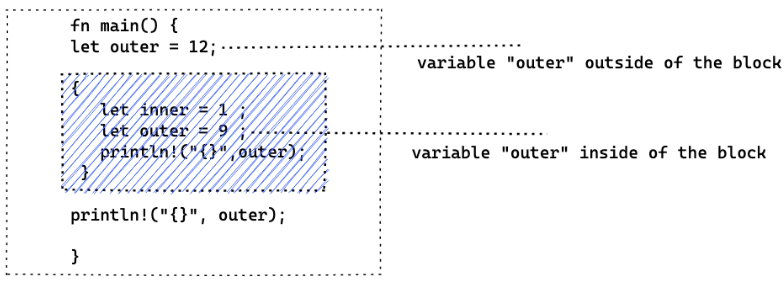scope and shadowing
Scope and Shadowing
The scope of a variable refers to the visibility of a variable, or , which parts of a program can access that variable.
It all depends on where this variable is being declared. If it is declared inside any curly braces {}, i.e., a block of code, its scope is restricted within the braces, otherwise the scope is global.
Types of Variables
There are two types of variables in terms of scope.
Local Variable
A variable that is within a block of code, { }, that cannot be accessed outside that block is a local variable. After the closing curly brace, } , the variable is freed and memory for the variable is deallocated.
Global Variable
The variables that are declared outside any block of code and can be accessed within any subsequent blocks are known as global variables.
The variables declared using the const keyword can be declared in local as well as global scope.

Note: The following code gives an error, ❌, since the variable created inside the inner block of code has been accessed outside its scope.
fn main() {
let outer_variable = 112;
{ // start of code block
let inner_variable = 213;
println!("block variable inner: {}", inner_variable);
println!("block variable outer: {}", outer_variable);
} // end of code block
println!("inner variable: {}", inner_variable); // use of inner_variable outside scope
}
output
error[E0425]: cannot find value `inner_variable` in this scope
--> main.rs:8:36
|
8 | println!("inner variable: {}", inner_variable); // use of inner_variable outside scope
| ^^^^^^^^^^^^^^ help: a local variable with a similar name exists: `outer_variable`
error: aborting due to previous error
To fix this error, the variable declaration can be moved outside the inner block of code. That way, the scope of the variable spans the entire main() function. This is shown below:
fn main() {
let outer_variable = 112;
let inner_variable = 213;
{ // start of code block
println!("block variable inner: {}", inner_variable);
println!("block variable outer: {}", outer_variable);
} // end of code block
println!("inner variable: {}", inner_variable);
}
Output
block variable inner: 213
block variable outer: 112
inner variable: 213
Shadowing
Variable shadowing is a technique in which a variable declared within a certain scope has the same name as a variable declared in an outer scope. This is also known as masking. This outer variable is said to be shadowed by the inner variable, while the inner variable is said to mask the outer variable.

The following code explains the concept.
fn main() {
let outer_variable = 112;
{ // start of code block
let inner_variable = 213;
println!("block variable: {}", inner_variable);
let outer_variable = 117;
println!("block variable outer: {}", outer_variable);
} // end of code block
println!("outer variable: {}", outer_variable);
}
Output
block variable: 213
block variable outer: 117
outer variable: 112
Quiz
Last updated 25 Jan 2024, 05:11 +0530 .